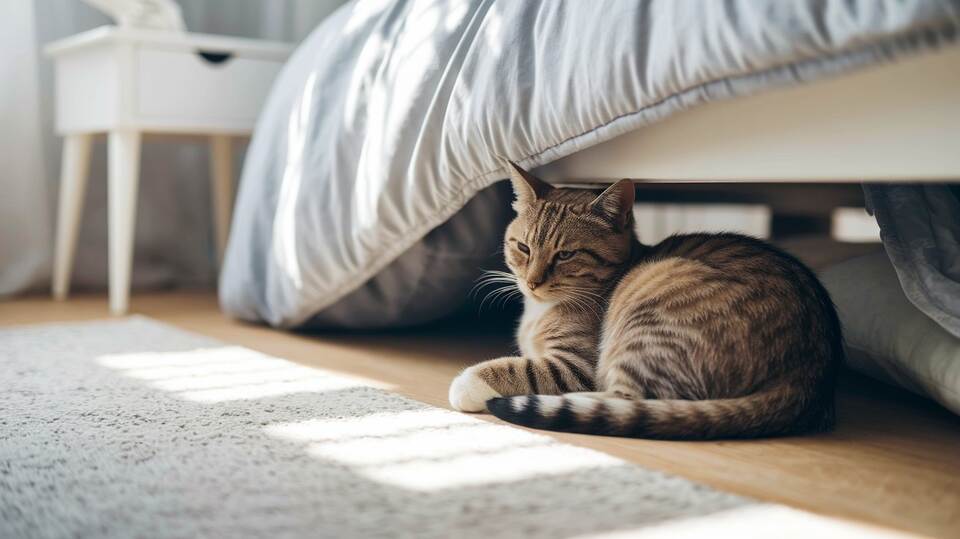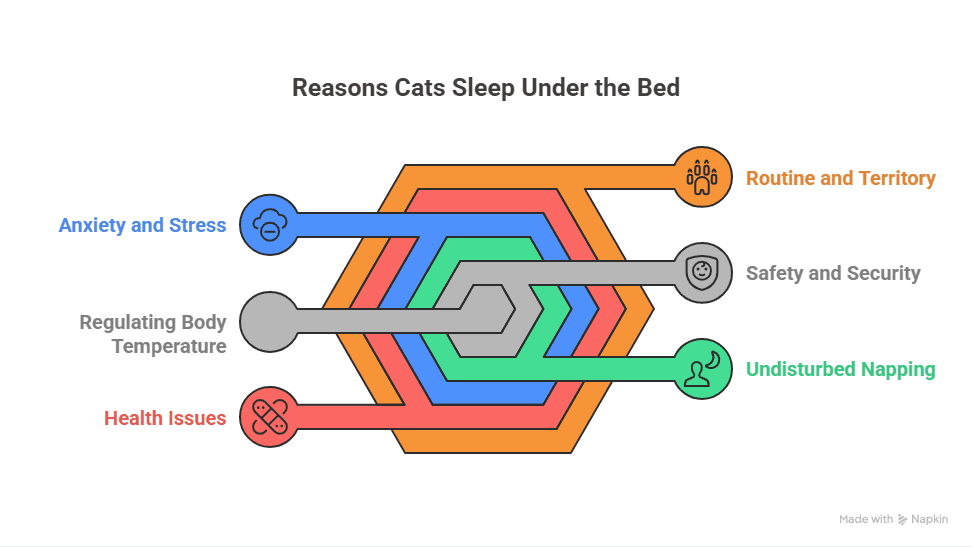
Introduction
You walk into your bedroom, expecting to find your cat curled up on the windowsill or lounging on the couch—but instead, they’re tucked away under the bed, fast asleep. Again.
If you’ve been asking yourself, “Why does my cat sleep under the bed?”, you’re not alone. This behavior is surprisingly common, and while it may seem odd (or even concerning) at first, it’s often rooted in natural feline instincts.
In this guide, we’ll explore the many reasons why cats love hiding out under the bed, when this behavior is perfectly normal, and when it might be time to take a closer look. Plus, we’ll share tips on how to make your home feel safer and more inviting—so your cat can nap wherever they feel most comfortable (even if it’s not under the bed).
Is It Normal for Cats to Sleep Under the Bed?
Yes—completely normal. In fact, sleeping under the bed (or in any tight, hidden space) is a deeply ingrained instinct for most cats. As both predators and prey in the wild, cats are hardwired to seek out safe, quiet places to rest. Under the bed checks a lot of boxes: it’s dark, it’s quiet, it’s enclosed, and it’s (usually) undisturbed.
So, if your cat frequently naps under the bed, it doesn’t necessarily mean something is wrong. However, context is everything—if your cat suddenly starts hiding more than usual or seems fearful, there could be something else going on.
Top Reasons Cats Sleep Under the Bed

Let’s explore the most common (and normal) reasons your cat might prefer this private little nook.
😌 1. It Feels Safe and Secure
Cats love having a territory where they feel totally in control. Under the bed:
- There’s only one or two access points (the sides or foot of the bed), so it’s easy to monitor who’s coming
- It’s low to the ground, meaning your cat feels “protected” from above
- The darkness and quietness create a soothing, cave-like space
Think of it as their version of a do-not-disturb sign.
💤 2. It’s a Great Place to Nap Undisturbed
If you live in a busy household with kids, dogs, or multiple people moving around, your cat might be seeking a little peace and quiet. Unlike the couch or windowsill, under the bed usually means:
- No one’s accidentally bumping into them
- No loud sounds
- No random vacuum cleaner visits (unless you’re really thorough)
😿 3. They’re Feeling Anxious or Stressed
Cats often retreat under the bed when they’re feeling uncertain about their environment. Some common triggers include:
- New people (guests, roommates, or a new baby)
- Loud noises (fireworks, construction, storms)
- Changes in furniture or layout
- Moving to a new home
If your cat is suddenly spending more time hiding, this may be their way of coping with stress.
🩺 4. They’re Not Feeling Well
Cats are masters at hiding pain or illness. It’s a survival instinct—they don’t want to appear vulnerable. So, if your cat is suddenly spending most of the day under the bed and showing other signs like:
- Decreased appetite
- Lethargy
- Vomiting or diarrhea
- Lack of grooming
…it might be time to check in with your vet.
Don’t ignore the signs—behavioral changes are often the first clue that something’s off.
🌡️ 5. They’re Regulating Their Body Temperature
Under the bed can be a cozy microclimate.
- In summer: It’s shaded, cool, and protected from sun exposure
- In winter: It’s insulated and warm if the floor traps heat
Your cat might be seeking comfort based on what their body needs at the time.
🎯 6. It’s Part of Their Routine
Some cats are just creatures of habit. If your cat has always enjoyed sleeping under the bed since kittenhood, they may simply view it as their “personal space.” There’s nothing wrong with that—as long as their behavior is consistent and healthy.
🐾 7. It’s Their Claimed Territory
Cats are territorial animals. By sleeping under the bed regularly, they’re marking it as part of their turf. If you notice your cat rubbing their face on the bed frame or kneading the carpet under there, they’re spreading their scent and reinforcing that it’s theirs.
Should You Be Worried If Your Cat Sleeps Under the Bed?
Most of the time, no.
However, there are cases when it’s worth paying closer attention:
🚩 1. It’s a Sudden Change
If your cat was always social or slept in open areas and suddenly begins hiding under the bed all day, this could indicate stress or illness.
🚩 2. They’re Hiding All Day, Not Just Sleeping
Occasional naps? Fine. But if your cat is hiding under the bed 24/7, refuses to come out for meals, or avoids interaction completely, it’s time to investigate.
🚩 3. They’re Displaying Other Concerning Symptoms
- Refusing to eat or drink
- Vomiting or diarrhea
- Limping or difficulty moving
- Excessive grooming or scratching
These signs point to something beyond simple shyness.
How to Encourage Your Cat to Sleep Elsewhere (If Needed)
Maybe you just got a new mattress, you’re worried about dust buildup, or you’d simply like your cat to sleep somewhere else. Here’s how to help them transition:
🛏️ 1. Offer Appealing Alternatives
Cats love high or enclosed spaces. Try:
- A cozy covered cat bed in a quiet corner
- A heated bed or blanket during colder months
- A window perch or elevated shelf for bird-watching naps
🧴 2. Use Calming Pheromones
Feliway diffusers or sprays mimic feline “happy” scents and help reduce anxiety—especially helpful in new or noisy homes.
🚫 3. Block Access (Temporarily)
- Use storage boxes under the bed
- Place a long storage container along the sides
- Use under-bed blockers from pet stores
This isn’t a punishment—it’s a way to nudge them toward exploring new spaces.
🐟 4. Use Positive Reinforcement
- Place treats or toys near the new sleeping area
- Gently encourage them with affection and rewards when they choose other nap zones
- Never drag or force them out of hiding—this only builds mistrust
🧸 5. Reduce Triggers for Stress Hiding
- Keep a consistent schedule (meals, playtime)
- Avoid loud noises or sudden changes
- Introduce new people, pets, or furniture slowly and calmly
Kittens vs. Adult Cats: Is There a Difference?
Yes!
🐱 Kittens
- Often hide under the bed when adjusting to a new home
- Still learning boundaries, routines, and trust
- Should gradually explore more once they feel secure
😼 Adult Cats
- May hide from stress or change
- Sometimes form long-term habits
- More likely to claim under the bed as “their” territory
In both cases, patience and observation are key.
FAQs
❓ Why does my cat only sleep under the bed during the day?
Many cats are more social at night and prefer quiet, undisturbed naps during the day. Under the bed offers a peaceful retreat from daytime noise and activity.
❓ Should I stop my cat from sleeping under the bed?
Not unless it’s interfering with their health, behavior, or your needs. If it’s not a concern for you or your cat, there’s no harm.
❓ How can I make under the bed safer for my cat?
- Vacuum regularly to reduce dust
- Remove cords or choking hazards
- Use storage bins to prevent them from squeezing into unsafe spots
❓ Is hiding under the bed a sign of depression?
Sometimes, yes—especially if paired with withdrawal, appetite loss, or changes in litter box behavior. Consult your vet if you notice a pattern.
Also Read - Can I Use Baby Wipes on My Cat? The Truth About Feline-Friendly Cleaning
Conclusion
So, why does your cat sleep under the bed?
Because it feels safe. It’s quiet, dark, and calm—everything a cat could want in a nap zone. In most cases, it’s nothing to worry about. But sudden changes in behavior, hiding all day, or signs of illness mean it’s time to pay attention and possibly seek veterinary advice.
The best thing you can do is create an environment where your cat feels secure and has options—whether that’s under the bed, on top of it, or curled up beside you.
At the end of the day, every cat is different. And if under the bed is your cat’s happy place? That’s totally okay.




